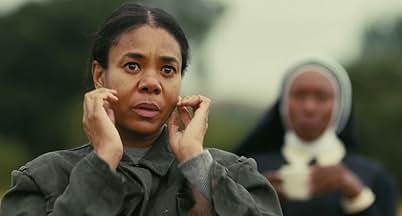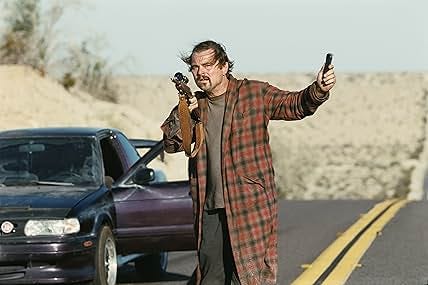Notes on "One Battle After Another"
The revolution televised in 70mm (672 words)
I was not moved by the cinematic revolution. From beginning to end, One Battle After Another kept me entranced for reasons I’m not convinced the film actually intended. Its scores were blaring, compositions vast, and actors’ performances satisfying. Throughout the film every element from the inclusion of Gil-Scott Herons “The Revolution Will Not Be Televised,” as hold music for a hotline to the clean, light makeup and retro car choices for props, all accumulated countless datum to analyze while not engulfed in any heart wrenching possibilities of the films possible themes; sacrifice, love, violence, resistance, lineage, fear…anything bigger than the actors names or the screen itself (shot in IMAX 70mm). I reemphasize the scores for almost every scene were overpowering though lyrically and sonically appropriate (this possibly being more so a gripe with the sound editing than the actual songs), particularly because at times the silence of a landscape and the blaring quiet of the cast, a hum of a helicopter or air conditioning unit would be enough to fill Paul Thomas Anderson’s expansively orchestrated scenes.
We are placed into the action-oriented pace of the fictional revolutionary organization, the French 75 as they plan and execute an operation on a US immigration detention center to declare war on US imperialism. Throughout the opening, I yearned for something moving to introduce a POV of figures not often or recently seen on such a large scale theatrical release. Teyana Taylor and the entire ensemble are cast exceptionally well as most are positioned in the binary of insurgents or agents of the state. Her charisma and bold stature are central to the plot, and similar to the French 75, explosive. Still, there is nothing shocking except for the formality of these technical decisions. Taylor, as the bold, audacious revolutionary doesn’t provide any entry into the the sacrifice or enduring struggle she and her comrades speak of throughout the film. Adjacent, I disclose I have a bias for the dramatic roles Regina Hall takes on and this is not an exception. As another member of the French 75, her ability to portray precise and bare tenderness, care and intensity may have been the closest moments to be pulled in by the film.
Another regard to pace, most scenes feel urgent, especially when dealing with DiCaprio’s character through the over 2hr 40min run time. There was no fatigue from the combination of sound and physical sequencings, producing cacophonous soundscapes at peak moments of transition. The sound didn’t bury me in revolutionary acts, it extracted me and revealed theatrics. Moreover, they added no deeper investment into any of the characters’ stories in tandem. I was appreciative there were no flashbacks of memories to flesh out characters’ motivations both practically and emotionally– Still, there was nothing terrifying or gut wrenching, nothing inspiring or fear mongering, nothing here but landscape. However beautifully rendered, vast and varying the California geography molded every scene beautifully, potentially distracting from the formal plot. One of the final scenes welds us to the rolling desert like hills of asphalt and sand that set the tension for a climax of the film. Enduring this and the quick shifts between character’s perspectives evoked another moment where I almost began to feel the weight of tensions or a scale of revolutionary stakes.
There was nothing to hate about this film except it presented nothing to hate– no disdain for any party portrayed which possibly could be a point of the film anyway. We are presented with a two state solution to revolutionary declarations with quips, where no sides are wrong and both are arbitrators of questionable ethics. In the end, We’re left with a family severed however intact and indicators of intergenerational reformations: new easily surveilled communication methods, protest over violence, a 2020s American face of progression. This was never planned to be a life changing film for me nor did I enter into the theater expecting revolutionary revelations but the cast and reputation of the crew led me to wonder still if something would stir me, that never came to fruition.
(Images courtesy of IMDb, 2025)



